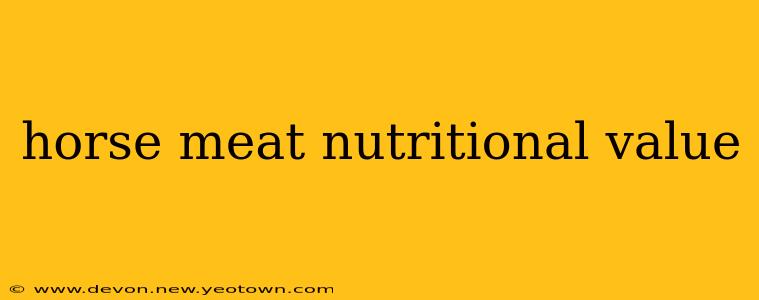For centuries, horse meat has been a staple in many cultures worldwide, particularly in Europe and Asia. However, in certain parts of the world, its consumption is less common, leading to misconceptions and a general lack of awareness regarding its nutritional profile. This comprehensive guide aims to dispel myths and provide a clear understanding of horse meat's nutritional value, answering common questions along the way.
Let's begin our journey into the world of equine nutrition, exploring its composition and benefits, and addressing any concerns you might have.
What is the Nutritional Composition of Horse Meat?
Horse meat is a lean, red meat packed with essential nutrients. Compared to other commonly consumed meats like beef or pork, it boasts a unique nutritional profile. It's lower in fat and cholesterol but rich in protein, iron, and several B vitamins. Think of it as a leaner, slightly less flavorful alternative to beef, offering a similar, hearty protein punch. Its texture is often described as tender and slightly sweeter than beef.
Is Horse Meat Higher in Protein Than Other Meats?
While not drastically higher than other lean red meats, horse meat does offer a significant amount of protein per serving. It's a complete protein source, meaning it contains all nine essential amino acids your body needs but cannot produce on its own. This makes it an excellent choice for building and repairing tissues, supporting muscle growth, and maintaining overall health. Compared to beef, the protein content is often comparable, offering a similar benefit in this respect.
How Does Horse Meat Compare to Beef in Terms of Fat Content?
This is where horse meat truly shines. It's significantly lower in fat than beef, particularly saturated fat. This makes it a more heart-healthy option for those watching their cholesterol levels. The lower fat content also translates to fewer calories per serving, making it a potentially beneficial addition to a weight-management diet. However, it's crucial to remember that the fat content can vary based on the cut of meat and the animal's diet.
What Vitamins and Minerals are Found in Horse Meat?
Horse meat is a good source of several essential vitamins and minerals. It's particularly rich in:
- Iron: Crucial for oxygen transport throughout the body.
- Vitamin B12: Essential for nerve function and red blood cell formation.
- Niacin (B3): Plays a vital role in energy metabolism.
- Riboflavin (B2): Important for cell growth and repair.
- Zinc: Supports immune function and wound healing.
These nutrients contribute to various bodily functions, emphasizing the importance of horse meat in a balanced diet for some cultures.
Is Horse Meat a Good Source of Iron?
Absolutely! Horse meat is an excellent source of iron, particularly heme iron, which is more easily absorbed by the body than non-heme iron found in plant-based foods. This makes it particularly beneficial for individuals at risk of iron deficiency anemia, although it is vital to consult a healthcare professional before making significant dietary changes.
What are the Potential Health Benefits of Eating Horse Meat?
The health benefits of horse meat stem primarily from its nutritional composition. Its high protein content supports muscle growth and repair, while its lower fat content contributes to cardiovascular health. The presence of essential vitamins and minerals further supports overall well-being. However, it is vital to remember that moderation and balance are key aspects of any healthy diet.
Conclusion: A Balanced Perspective
Horse meat offers a valuable nutritional profile, particularly for those seeking a lean, protein-rich alternative to other red meats. Its lower fat content and rich mineral profile make it a noteworthy option, especially for those focused on heart health and overall well-being. However, like any dietary choice, moderation and balance are key. Before making significant changes to your diet, particularly if you have specific health concerns, consulting a doctor or registered dietitian is always recommended. Remember to consider the sourcing and preparation methods of your food to ensure you're getting the most from your dietary choices.

